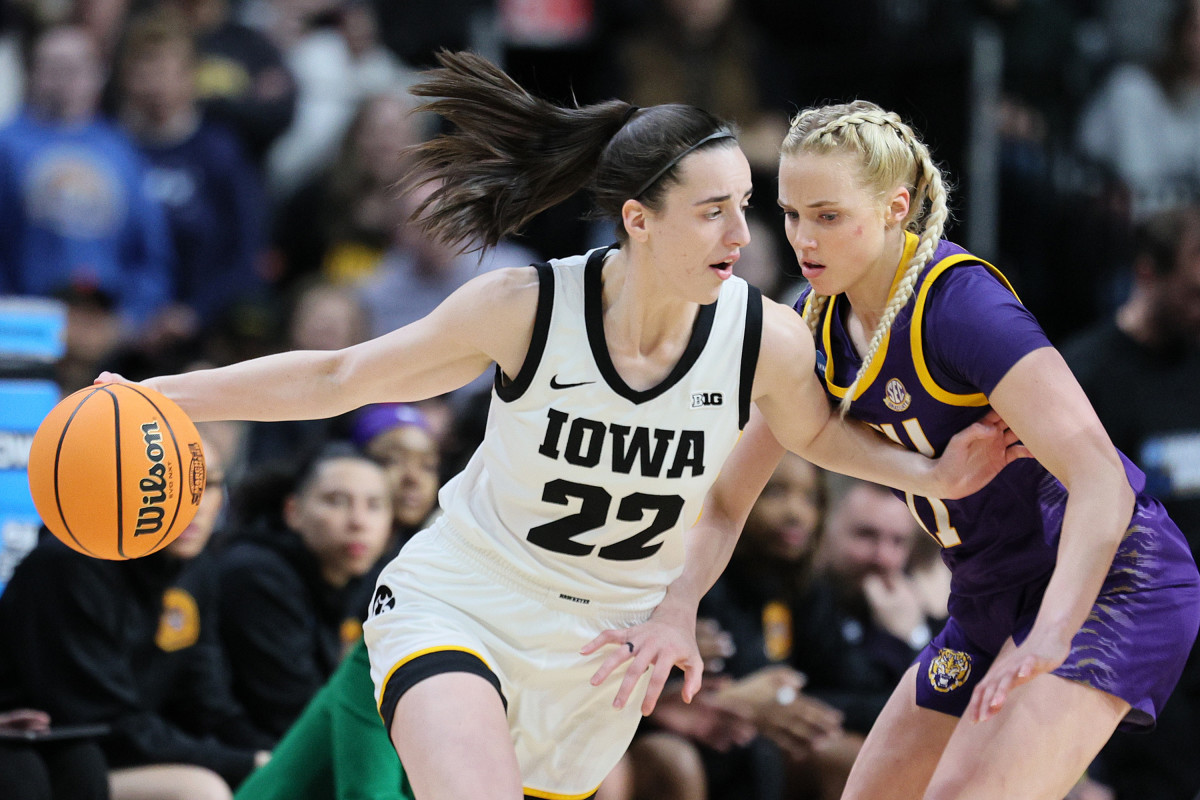
More people watched the NCAA Women's Basketball National Championship Game than the Men's National Championship game for the first time in history, per data from Sports Media Watch.
The Men's National Championship game on April 8 — which saw the University of Connecticut Huskies prevail, 75-60, over the Purdue Boilermakers — was seen by an average of 14.823 million viewers across TBS, TNT and TruTV, according to Sports TV Ratings.
That's the second lowest rated Men's Championship of all time, and over 4 million viewers less less than the 18.89 million for the Women's Championship Game that had the University of South Carolina Gamecocks defeat the Iowa Hawkeyes, 87-75, on Sunday, April 8.
There was actually some precedent for this, as the Women's Final Four game that had Caitlin Clark's Hawkeyes defeat Paige Bueckers and the Huskies had 14.42 million viewers across ESPN channels, more than either of the Men's Final Four games.
Clark's gargantuan rise clearly helped steer the rise on the Women's side, but there were also some drivers for the low number on the Men's side.
Related: Women's basketball is gaining ground, but is March Madness ready to rival the men's game?
The game aired on Turner cable channels, which generally don't have as big of a reach as broadcast channels like ABC, where the Women's Final aired.
The 2024 Women's Final actually had more viewers than any of the Men's Championship games broadcasted on Warner Bros. Discovery's (WBD) Turner channels over the last decade.
Here's how the 18.7 million average viewers for the 2024 Women's National Championship Game compares to the last decade of Men's Games.#NCAAWBB #MarchMadnessWBB pic.twitter.com/FQanxNuh2h
— Colin Salao (@colincsalao) April 8, 2024
However, the Women's Final Four game of Iowa and UConn was aired on Disney-owned (DIS) ESPN's cable channels and still outpaced any of the two Men's Final Four games.
On the Men's Championship side, there were also complaints about the late start time. The game tipped off at 9:20 p.m. Eastern Time on a Monday.
The Women's game did air on the favorable day of Sunday, though it tipped at 3 p.m. Eastern Time instead of a primetime slot.
But perhaps that biggest drawback for the Men's side could still go back to what many pundits have been pointing at all season — the lack of star power. Men's athletes are able to go to the NBA after just one year, making it harder for players to gain a following or emotional investment from the fans.
Related: WNBA Commissioner has big plans for the league's next media rights deal
LeBron James made this exact point during the episode of his podcast "Mind The Game" that released on April 9.
"[The men] have the ability to go to the NBA right after our freshman year," James said. "In the Women's game, you have the ability to build your legacy and build your rapport and brand with that fanbase, with that community."
The WNBA rules that player are only able to declare for the draft if they turn 22-years-old during the year when the draft takes place. NBA aspirants can declare if they are just 19-years-old on the year of the draft.
That makes it so that many Women's players play out all four years in college, which is what the likes of Clark and Angel Reese have done.
Some of the biggest top college stars in the Men's game only spent a year before getting drafted with a top pick in the NBA. These are the likes of Zion Williamson, Paolo Banchero, and John Wall. Top high school prospect Cooper Flagg will likely spend just one year at Duke before going to the NBA.
The question will still be up in the air whether the Women's game can sustain its viewership push with Clark set to be drafted to the WNBA on April 15; The other Final Four Women's game between NC State and South Carolina saw 7.1 million viewers, still a strong performance compared to past years, but less than the both Men's Final Four games.
But the Women's side will still enter next year with big names like coach Dawn Staley, Bueckers, and University of Southern California's JuJu Watkins, who was only a freshman this year, that could help carry the torch after Clark goes pro.
Related: How NCAA Women's Final record viewership stacks up to the men's







